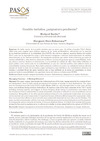Identificador persistente para citar o vincular este elemento:
https://accedacris.ulpgc.es/jspui/handle/10553/114319
| Título: | Gestión turística ¿asignatura pendiente? | Otros títulos: | Managing tourism: a missing element? | Autores/as: | Butler, Richard Hart Robertson, Margaret Jean |
Clasificación UNESCO: | 531290 Economía sectorial: turismo | Palabras clave: | Integral management of tourism destinations Overtourism Adaptation to change Resilience Gestión integral del destino turístico, et al. |
Fecha de publicación: | 2022 | Proyectos: | Post covid Responsible Community Tourism | Publicación seriada: | Pasos: revista de turismo y patrimonio cultural | Resumen: | The paper argues that despite the widespread use of the term management in the context of tourism destinations, there is little actual management of tourism or tourists in most destinations. The paper uses the Tourism Area Life Cycle (TALC) model (Butler 1980) as a lens through which to view some current issues and problems facing tourism destinations. It explores some of the basic elements of the TALC model including carrying capacity and triggers or forces bringing about change in destinations and argues that the reluctance of many stakeholders to adopt sustainable principles is reflected in current problems such as overtourism. Recognition of the often ignored political element in the sustainable triumvirate of economic, environmental and social components is important because without political support for appropriate initiatives has meant that efforts to move towards more sustainable destinations have often proved fruitless. The paper concludes that despite calls for new ways of defining success for tourism destinations and for drastically changing the nature and scale of tourism in the post-pandemic future, it is likely that tourism will resume, at least for the short to medium term, in a form very similar to what existed before the advent of COVID-19. Se habla mucho de la gestión turístico mas se ejerce poco. Se utiliza el modelo TALC (Butler 1980) como gran angular para explorar algunos de los temas problemáticos enfrentados por la mayoría de los destinos turísticos en la actualidad (pre ‑COVID). Se centra en algunos aspectos básicos del modelo TALC como son la capacidad de carga y otras fuerzas endógenas o externas desencadenantes de cambios determinantes en los destinos turísticos. Se argumenta asimismo que exista cierta reticencia por parte de muchos stakeholders, sobre todo los elementos políticos a la hora de gestionar para la sostenibilidad, hecho que aboca a muchos destinos al sobreturismo y a la pérdida de calidad de vida. Hace falta visibilizar el papel político como cuarta pata de la sostenibilidad, ya que sin voluntad política, todo esfuerzo hacia la sostenibilidad termine fracasando. Hace falta asimismo redefinir la escala y la calidad del turismo ofrecido además de medir el éxito de un destino según parámetros muy distintos a los cuantitativos (números de turistas y cantidad bruta del gasto turístico) que se han utilizado en la época pre ‑pandémica: es decir, gestionar hacia la sostenibilidad y la seguridad, claves del éxito en el futuro post‑COVID |
URI: | https://accedacris.ulpgc.es/handle/10553/114319 | ISSN: | 1695-7121 | DOI: | 10.25145/j.pasos.2022.20.019 | Fuente: | Pasos: revista de turismo y patrimonio cultural [ISSN 1695-7121], v. 20 (2), p. 265-274, (Abril-Junio 2022) |
| Colección: | Artículos |
Citas de WEB OF SCIENCETM
Citations
2
actualizado el 25-ene-2026
Visitas
38
actualizado el 10-ene-2026
Descargas
14
actualizado el 10-ene-2026
Google ScholarTM
Verifica
Altmetric
Comparte
Exporta metadatos
Los elementos en ULPGC accedaCRIS están protegidos por derechos de autor con todos los derechos reservados, a menos que se indique lo contrario.
